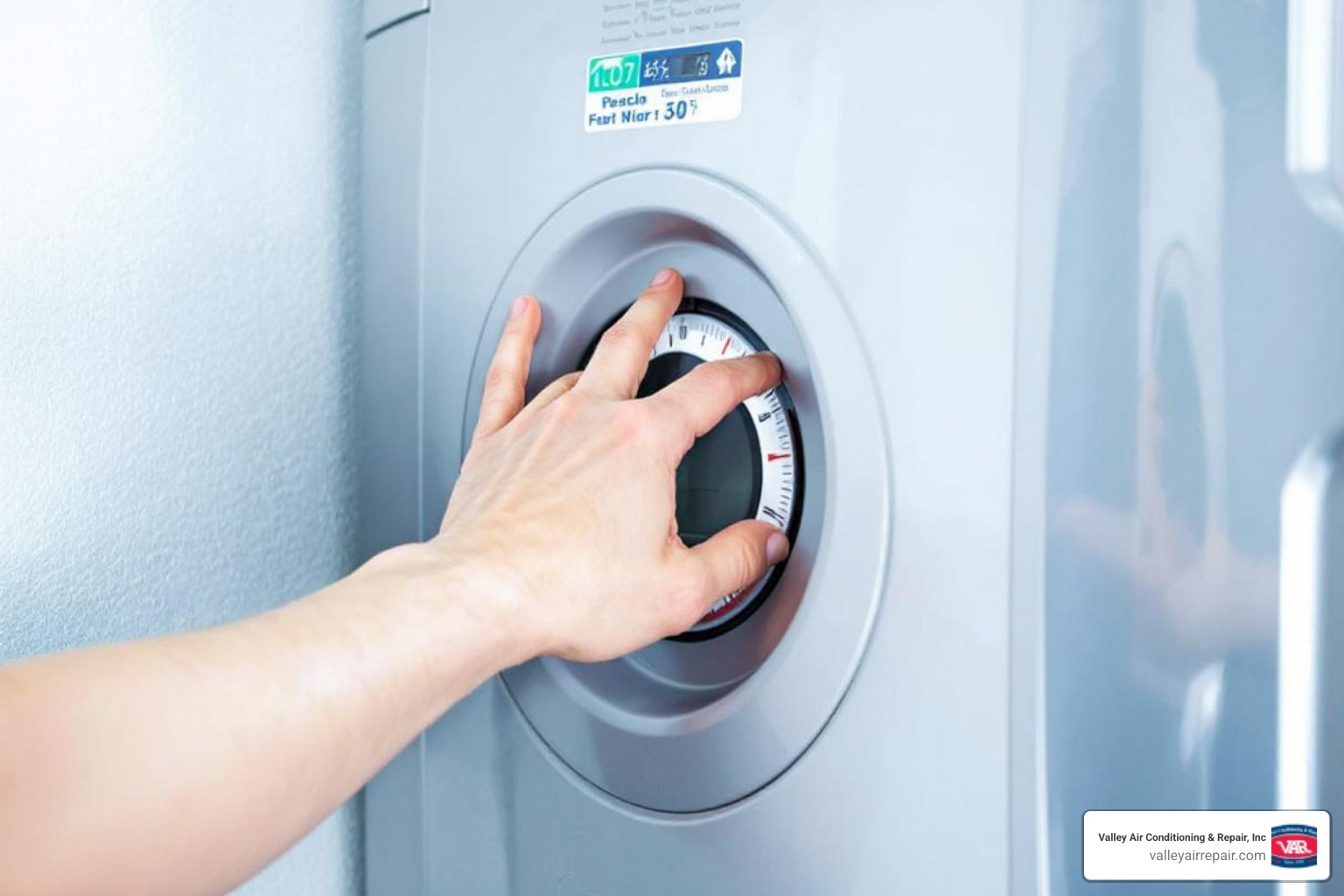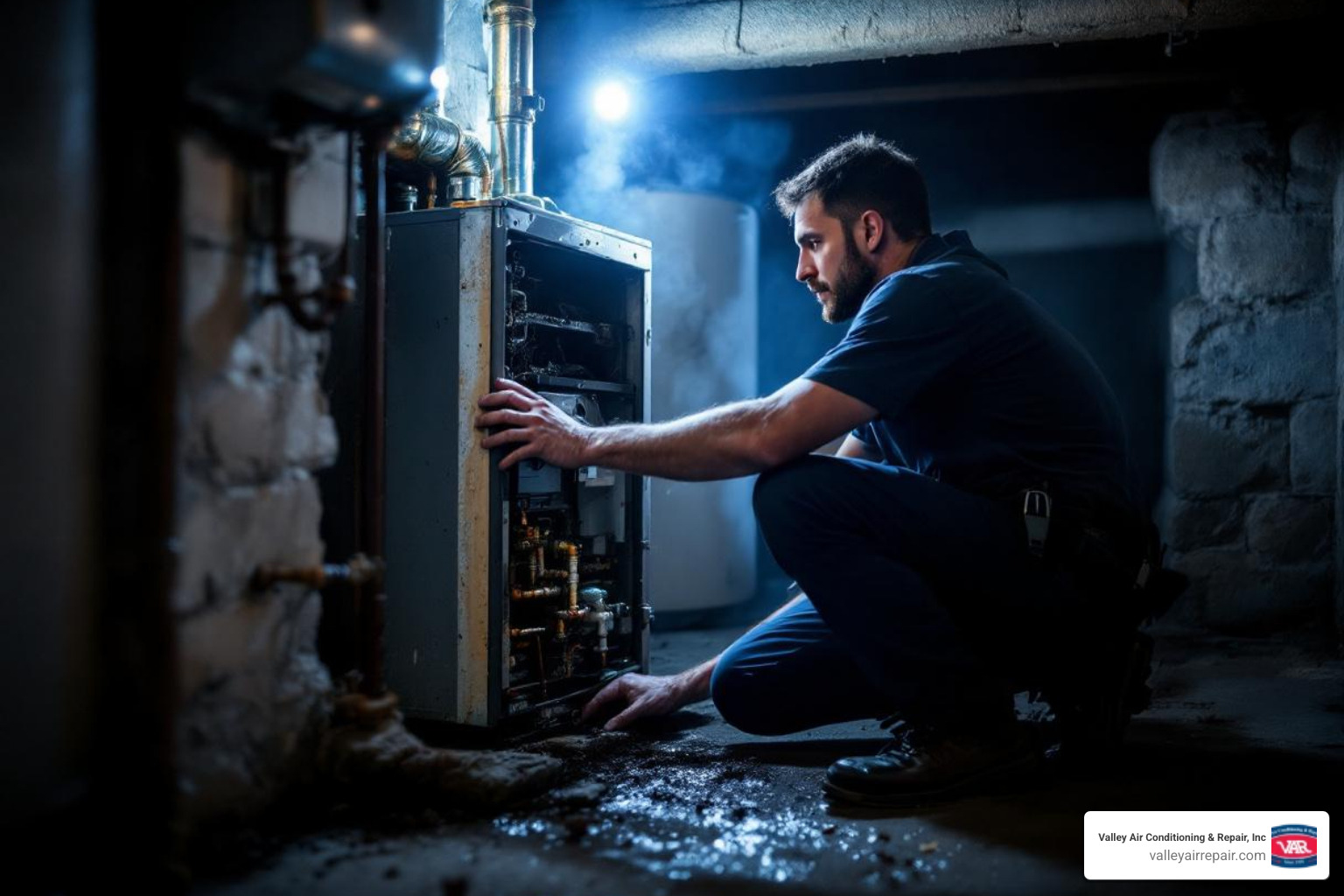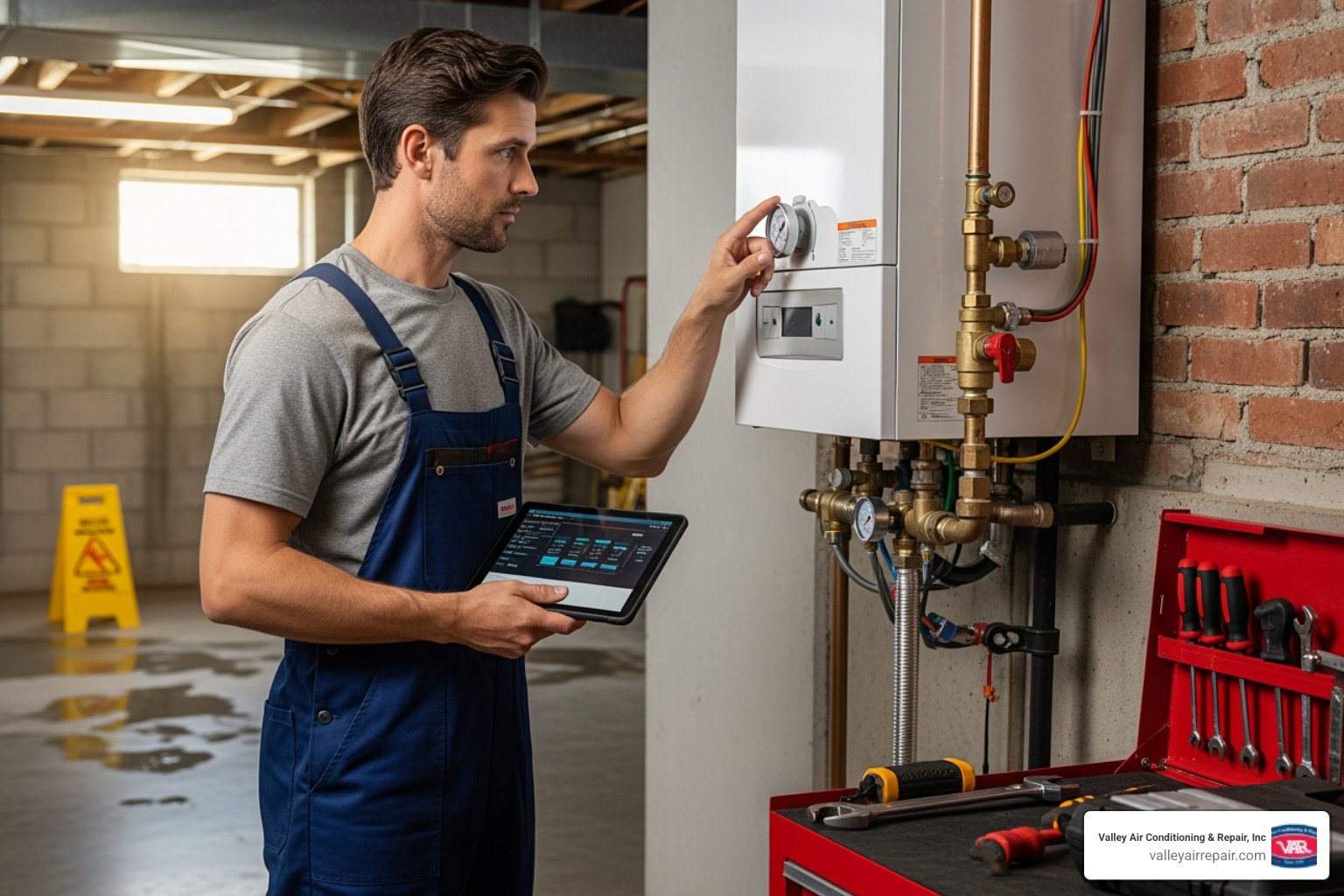Is Your AC Unit Playing Hard to Get? Simple Fixes When It Won't Turn On
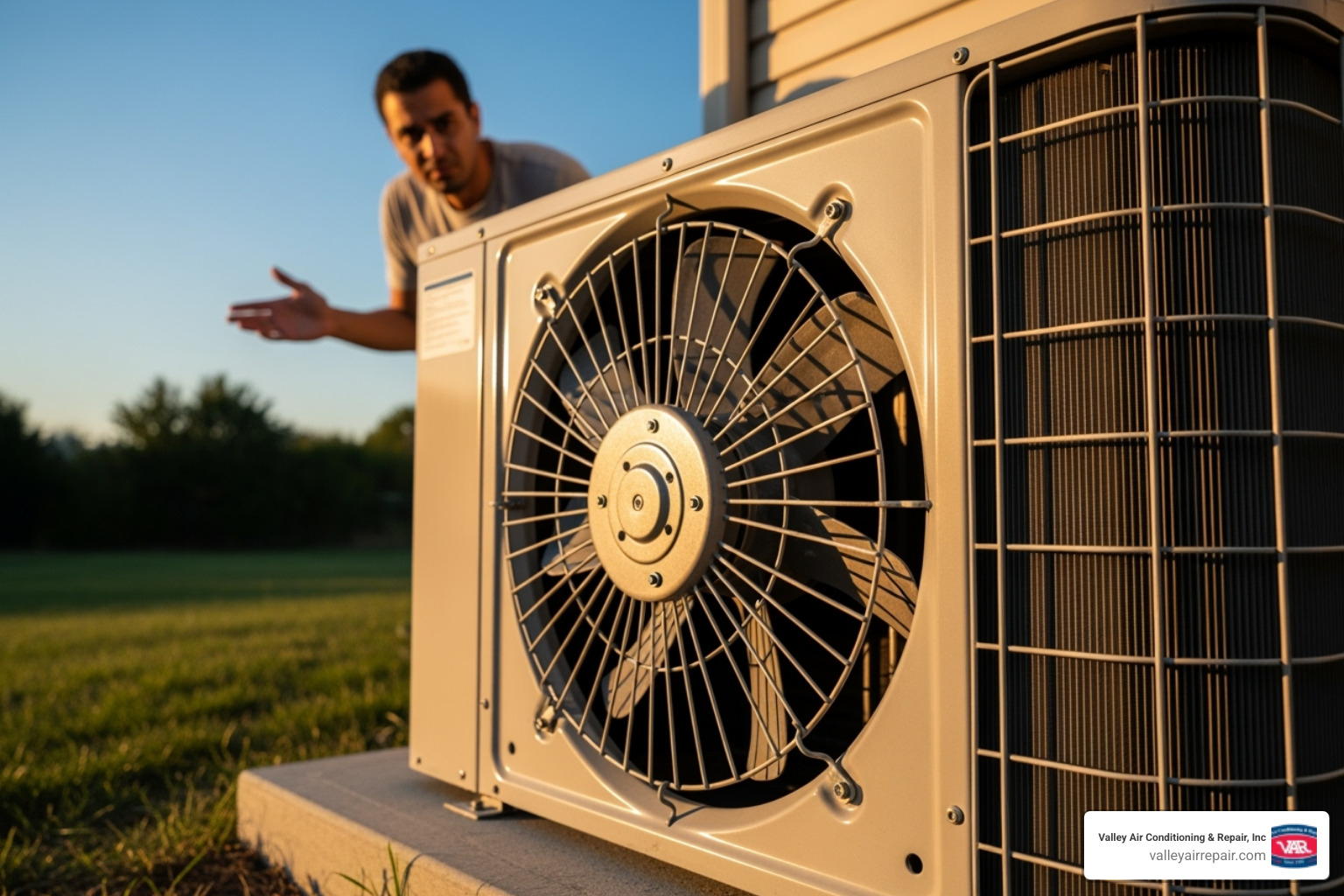
When Your Air Conditioner Refuses to Start
When your ac unit won't turn on during a sweltering summer day, it feels like your home's lifeline has been cut. Nothing's more frustrating than hitting that thermostat button and getting... nothing.
Quick fixes to try when your AC won't start:
- Check the circuit breaker - Look for a tripped breaker and reset it
- Verify thermostat settings - Ensure it's set to "cool" and below room temperature
- Replace the air filter - A clogged filter can trigger safety shutoffs
- Check power switches - Look for turned-off switches near indoor and outdoor units
- Press the reset button - Many outdoor units have a reset button to try
Most AC startup problems stem from simple power issues or safety features doing their job. A tripped circuit breaker is often the culprit, especially after storms or power surges. Sometimes it's as basic as someone accidentally flipping the wrong switch or forgetting to change a filter for months.
The good news? Many of these issues don't require an expensive service call. With some basic troubleshooting, you might have cool air flowing again in minutes. But knowing when to stop and call a professional can save you from turning a small problem into a costly repair.
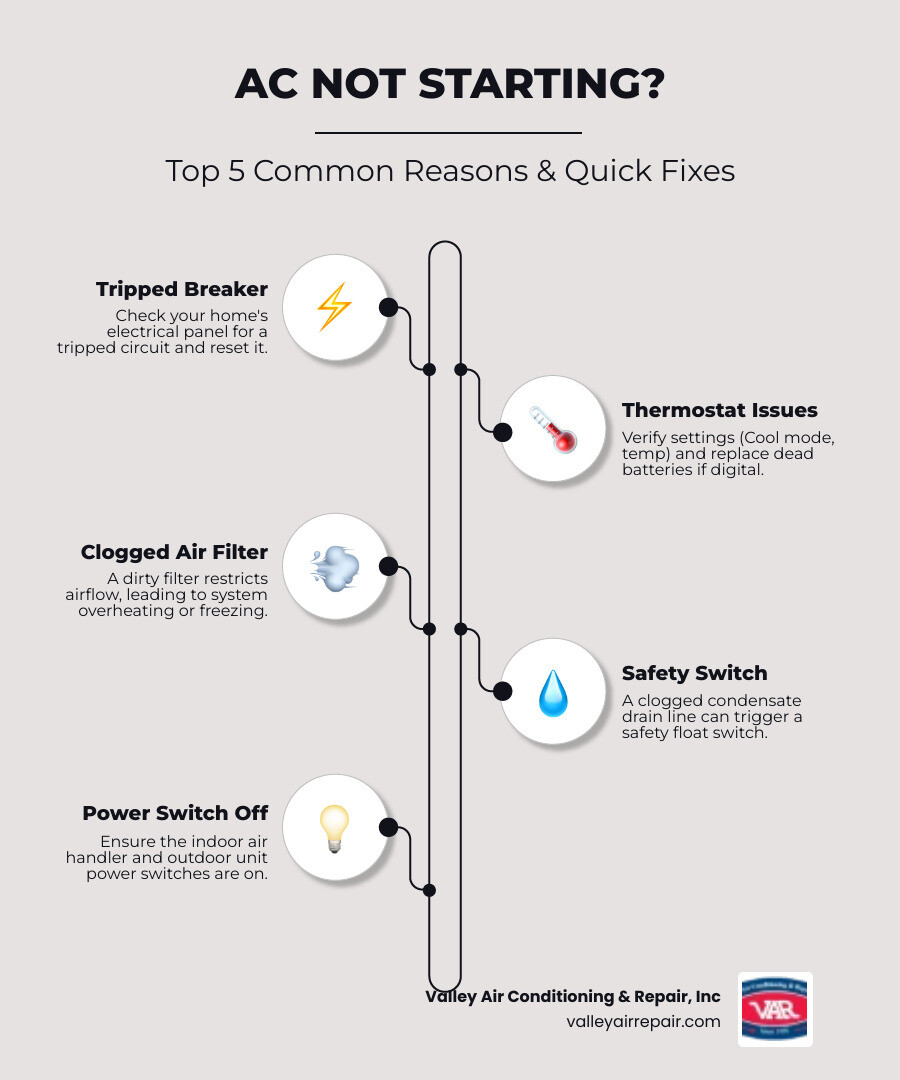
First-Response Checklist: Simple Power and Thermostat Fixes
When your ac unit won't turn on, don't panic. Most startup problems are due to simple power issues or thermostat settings you can fix in minutes. These first-response checks often solve the problem without needing special tools or technical knowledge.
Check Your Power Supply
Your circuit breaker protects your electrical system by cutting power during a surge. While helpful, this can leave you sweating when your ac unit won't turn on.
Go to your electrical panel and find the AC breaker. A tripped breaker will be in the "off" position or stuck in the middle.
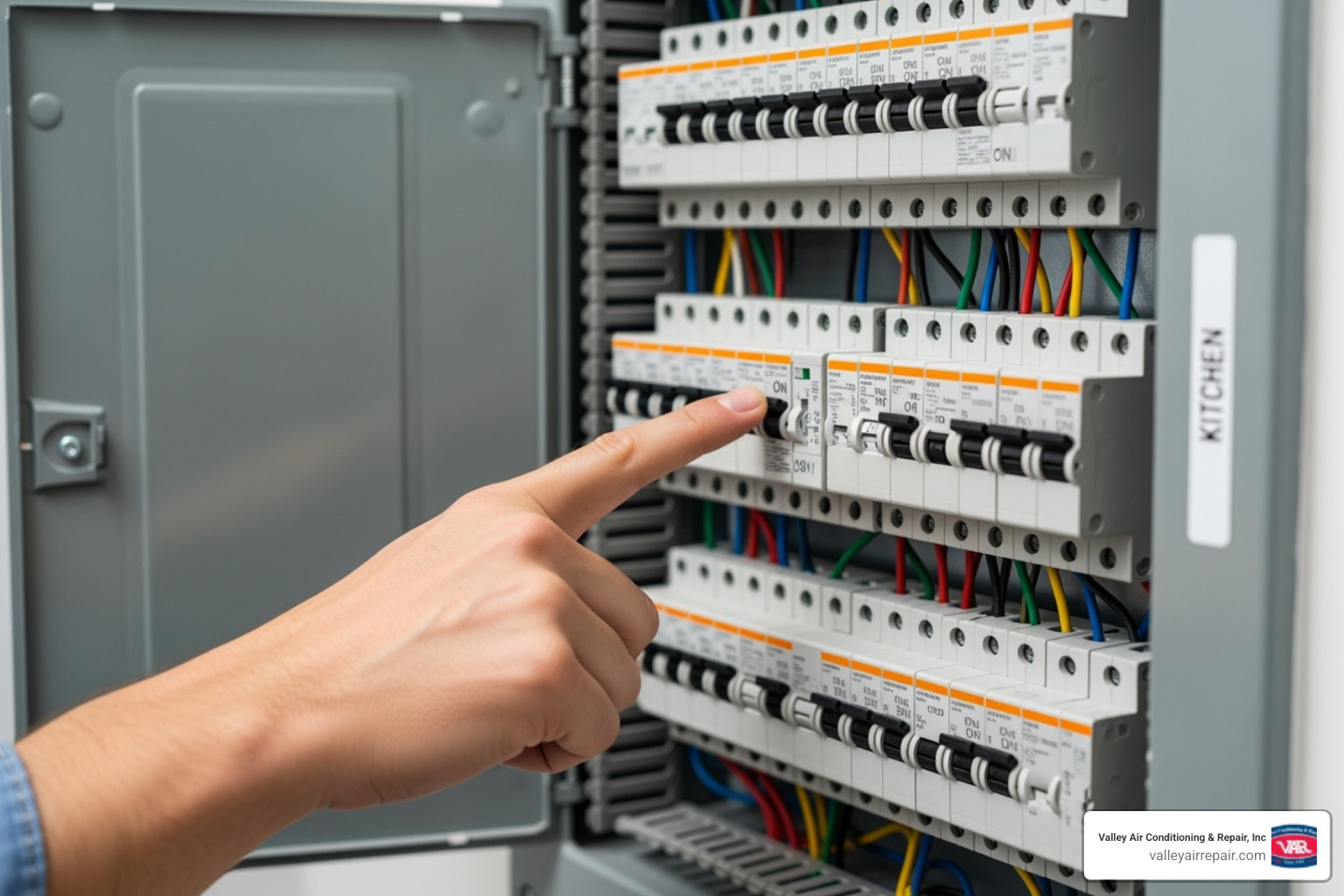
To reset it, push the switch fully to "off" before flipping it firmly back to "on." If the breaker trips again, stop there. This indicates a deeper electrical problem that needs a professional. Older homes may have a blown fuse, which will need to be replaced.
Also, check the outdoor disconnect switch near your unit and the indoor shutoff switch near the air handler. These look like light switches and are often flipped by accident. Power surges can trigger these shutoffs; a surge protector can help prevent this. For guidance on resetting breakers, see this resource: How to safely reset a circuit breaker.
Thermostat Checks: What to Do When Your AC Unit Won't Turn On
Your thermostat controls your AC. If it's not set correctly, your ac unit won't turn on.
First, make sure it's set to "cool" mode and the temperature is at least 5 degrees below the current room temperature. Your AC won't run if the set temperature is higher than the room's.
Dead batteries are a common cause for digital thermostats. Replace them if the display is blank, dim, or acting erratically.
The thermostat's location also matters. Direct sunlight or proximity to heat sources like lamps can give it false readings, preventing it from calling for cool air.
Faulty sensors can also cause issues. If the thermostat behaves unpredictably, the internal sensor may be failing.
Finding and Using the Reset Button
Many outdoor AC units have a reset button for minor electronic faults. Look for a small red or black button on the control panel.
Press and hold this button for 3-5 seconds. This can clear temporary faults preventing startup.
If there's no reset button, you can manually reset the system by power cycling. Turn the thermostat to "off," then flip the AC's circuit breaker to "off." Wait 5 to 10 minutes. This wait allows components to discharge and reset.
Afterward, flip the breaker back on, set the thermostat to "cool," and give the system a few minutes to start. This manual reset often clears minor glitches.
Why Your AC Unit Won't Turn On: Common Airflow and Drainage Problems
Sometimes your ac unit won't turn on because its built-in safety features have been triggered. These protective shutoffs often happen when airflow is blocked or water is backing up where it shouldn't.
The Clogged Air Filter Conundrum
A dirty air filter is a surprisingly common reason your ac unit won't turn on. When the filter is clogged with dust and debris, your AC works overtime to pull in air, causing a domino effect of problems.
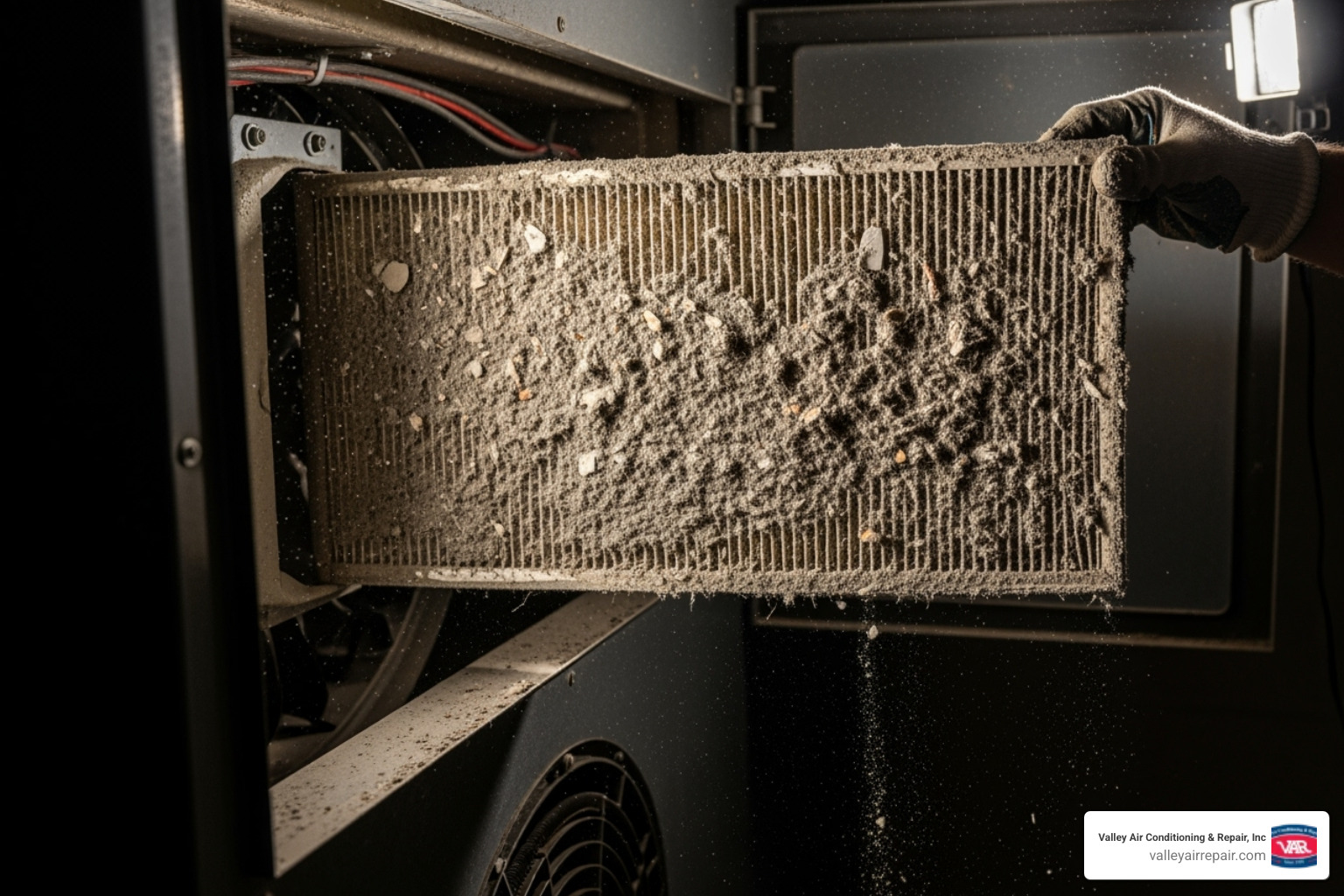
The strain can cause the motor to overheat, triggering a safety switch that shuts the system down. Restricted airflow can also cause the evaporator coils to freeze. Without enough air, moisture on the coils turns to ice, stopping the cooling process and triggering another shutdown to prevent damage. This system strain also causes unnecessary wear on moving parts.
This is preventable. Check your filter monthly and replace it every 1-3 months (more often if you have pets or allergies). It's a cheap way to keep your AC running smoothly.
Is a Clogged Condensate Drain Line the Culprit?
Your AC also dehumidifies your home, and the collected water exits through the condensate drain line. Over time, algae and mold can clog this line, causing water to back up into the drain pan.
Most systems have a float switch or wet switch in the drain pan. If water levels get too high, this switch shuts off the AC to prevent water damage. If your ac unit won't turn on and you see water in the drain pan, this is likely the cause. The system is protecting your home.
To fix this, turn off the power at the breaker. You can use a wet/dry vacuum on the outdoor end of the drain line to clear the clog. Alternatively, pour a cup of white vinegar into the line's access point, wait 30 minutes, and then flush with water. Regularly cleaning the drain line can prevent future clogs.
Dealing with a Frozen AC Unit
A frozen AC is a serious problem that will stop your unit from working. Ice on the coils or lines renders the system useless. Signs of a frozen unit include visible ice, weak airflow, or the AC running without cooling.
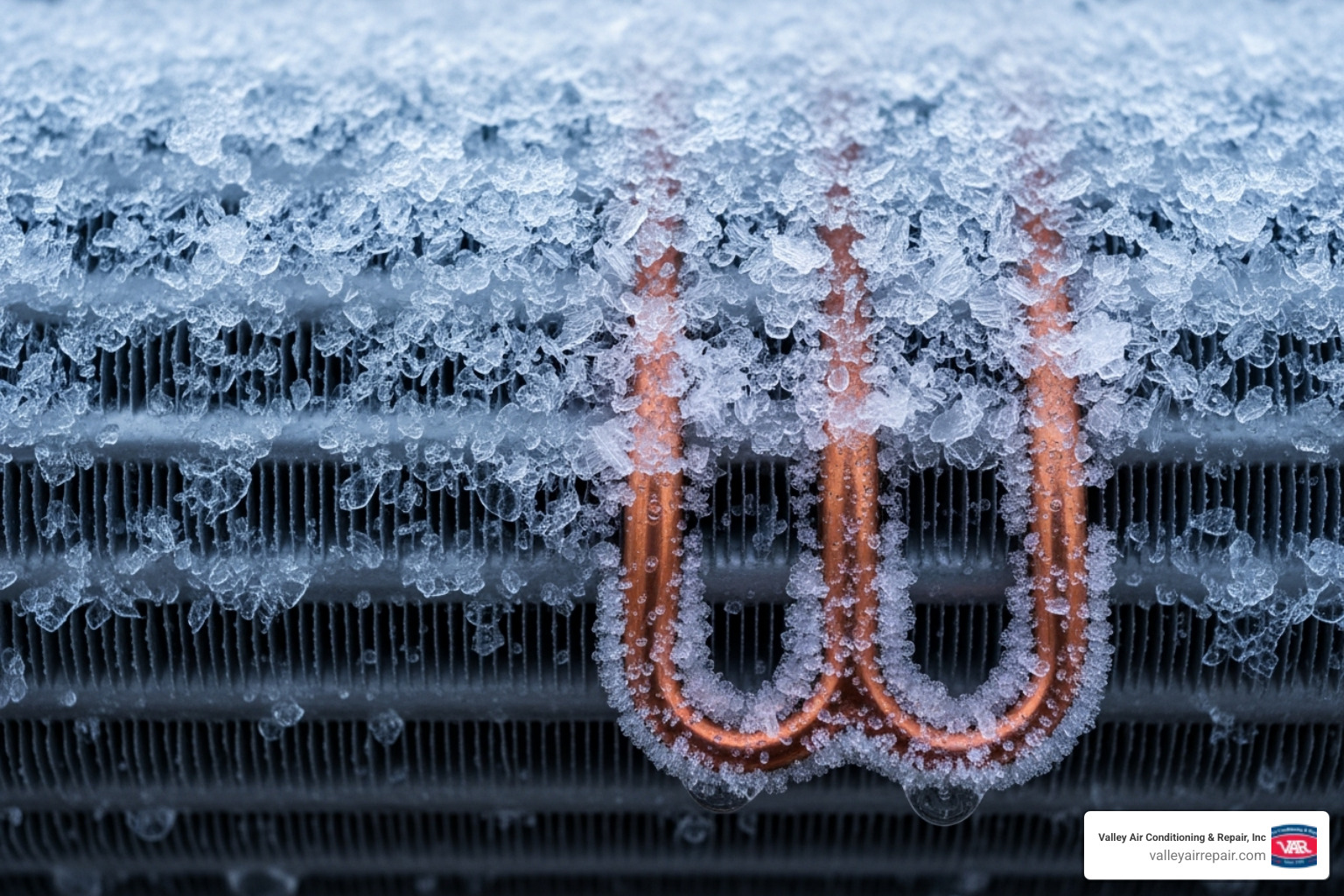
The most common causes are poor airflow from a clogged filter or low refrigerant due to a leak.
If your AC is frozen, turn it off at the thermostat to let it thaw naturally. Do not chip the ice. The thawing process can take several hours to a full day. To speed it up, switch the thermostat to fan-only mode. Be prepared with towels to catch melting ice.
After it thaws, replace the air filter if it's dirty. If the unit freezes again, there's likely an underlying cause, such as a refrigerant leak, that requires a professional.
When to Call a Professional: Deeper Electrical and Mechanical Failures
If your troubleshooting efforts fail, your ac unit won't turn on because of a deeper issue requiring professional expertise. These problems often involve high-voltage components and complex mechanical systems. For your safety, it's crucial to know when to stop and call a technician.
Electrical Issues: When a Faulty Component Means Your AC Unit Won't Turn On
Internal electrical failures can stop your AC even if the breaker and thermostat seem fine. These issues can be subtle and hard to diagnose.
- Faulty Capacitor: A failed capacitor is a common reason your ac unit won't turn on. It provides the electrical boost to start the motors. Signs of failure include a humming or clicking outdoor unit that won't start. Never try to replace one yourself, as they can hold a fatal electrical charge even when the power is off.
- Contactor Failure: This component acts as a switch, and if it's burnt or stuck, it won't allow power to flow to the outdoor unit.
- Wiring Problems: Issues from wear, weather, or pests can also prevent startup. Loose or corroded wires are dangerous and require professional diagnosis.
Call a professional immediately if you notice clicking noises, humming sounds from a non-starting unit, or any burning smells, which signal a serious electrical hazard.
Mechanical Failures and Refrigerant Leaks
Mechanical problems can also prevent startup and require professional diagnosis.
- Faulty Compressor: The compressor is the engine of your AC. If it fails, the system won't work. You might hear grinding or screeching, or just silence.
- Broken Fan Motor: Fan motor failures, either indoors or outdoors, are also critical. A failed indoor motor stops air circulation, while a failed outdoor motor causes overheating and shutdown. A humming sound can indicate a motor is trying but failing to start.
- Refrigerant Leaks: These often trigger safety switches that shut the system down to prevent compressor damage. This is why your ac unit won't turn on. Signs of a leak include hissing sounds, ice formation on lines, or an oily residue. Due to Environmental Protection Agency regulations, only certified technicians can legally and safely handle refrigerant.
Has Your AC Reached the End of Its Lifespan?
Sometimes, an ac unit won't turn on because it's old. Most systems last 15-20 years, and as they age, small problems can lead to frequent breakdowns. Signs your AC may need replacement include:
- Frequent repairs
- Rising energy bills
- Decreased performance and inconsistent cooling
- Strange noises or odors like grinding or burning smells
- Improper sizing issues causing premature wear
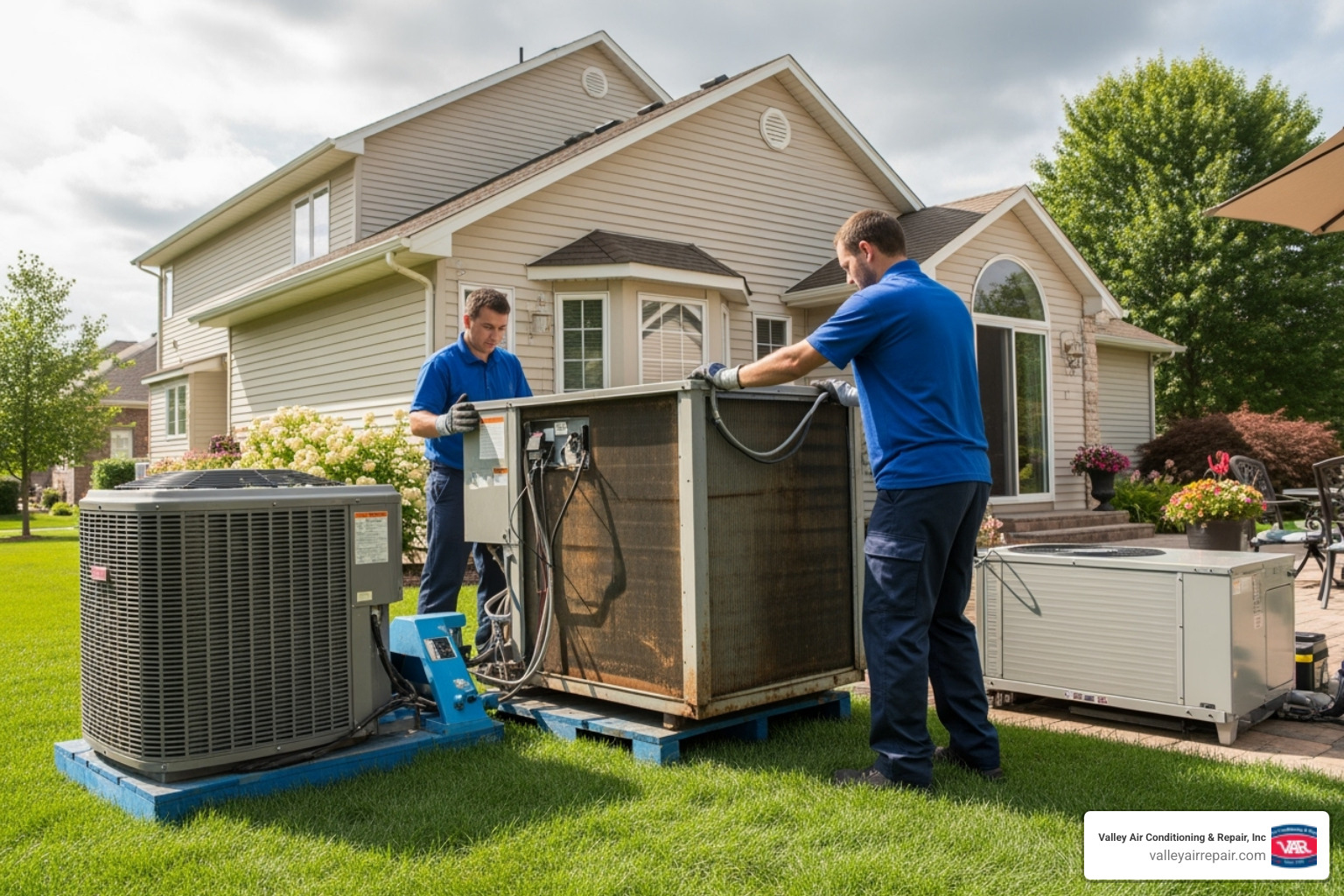
Repairing major components on old units can be costly. Our technicians can help you evaluate whether repair or replacement makes the most sense based on your system's age, condition, and efficiency.
Frequently Asked Questions about a Non-Starting AC
When your ac unit won't turn on, questions abound. Here are answers to the most common concerns we hear from Valley homeowners.
Why is my AC clicking but not turning on?
A clicking sound means your AC is receiving the signal to start, but a component is failing to engage. The thermostat is likely working, but your ac unit won't turn on because a crucial part isn't responding. This could be a failing capacitor (which provides the startup jolt to the motors), a faulty contactor (the main power switch), or a motor that is struggling to start.
These issues involve dangerous high-voltage components and require a professional. Fortunately, these parts can often be replaced without a full system replacement.
Why did my AC suddenly stop working?
Sudden failure is usually due to a power interruption or a safety switch activation.
A tripped circuit breaker is a common cause, often triggered by a power surge. Blown fuses in older homes or the outdoor disconnect box can also cause a sudden shutdown. A safety switch can also be the cause; for example, a float switch will cut power if the condensate drain is clogged to prevent water damage. A capacitor can also fail suddenly, preventing the AC from starting its cooling cycle.
How do I force my AC to turn on?
You should never try to "force" your AC to start, as this can turn a simple repair into a major, expensive one. Instead, you can safely perform a system reset.
Turn the thermostat off, then flip the AC's circuit breaker to the "off" position. Wait 5-10 minutes to allow internal components to reset. After waiting, turn the breaker back on. Set the thermostat to "cool" and a temperature several degrees below the room's current temperature. Allow a few minutes for the system to respond.
If your ac unit won't turn on after a reset, it indicates a problem that needs a professional. Repeatedly trying to start it can damage expensive components like the compressor.
Your Comfort is Our Priority
When your ac unit won't turn on despite your best troubleshooting efforts, it's telling you something important: there's a deeper problem that needs professional attention. We know how frustrating it can be to work through all these steps only to still be sitting in a warm house, but this is exactly when calling in the experts becomes your smartest move.
For Valley homeowners, trying to push past these warning signs often turns a manageable repair into a major headache. What might start as a simple capacitor replacement can quickly become a costly compressor failure if the underlying issue isn't properly diagnosed and fixed.
Since 1970, Valley Air Conditioning & Repair, Inc. has been the trusted name that families in our community turn to when their comfort is on the line. We've built our reputation one satisfied customer at a time, focusing on honest service and reliable solutions rather than flashy marketing. Our experienced technicians don't just fix the immediate problem – they take the time to identify what caused it in the first place, helping prevent future breakdowns.
We understand that when your AC stops working, especially during those blazing Valley summers, every hour counts. That's why our team is equipped with the specialized tools and genuine parts needed to diagnose electrical issues safely, handle refrigerant properly, and restore your home's comfort efficiently. We've seen it all over the decades, from mysterious clicking sounds to complete system failures, and we know exactly how to get your family back to enjoying cool, comfortable indoor air.
Don't let a stubborn AC unit disrupt your daily life or risk turning a small problem into an expensive disaster. Schedule your AC service in Fresno today and let our trusted professionals take care of the rest.




.webp)



